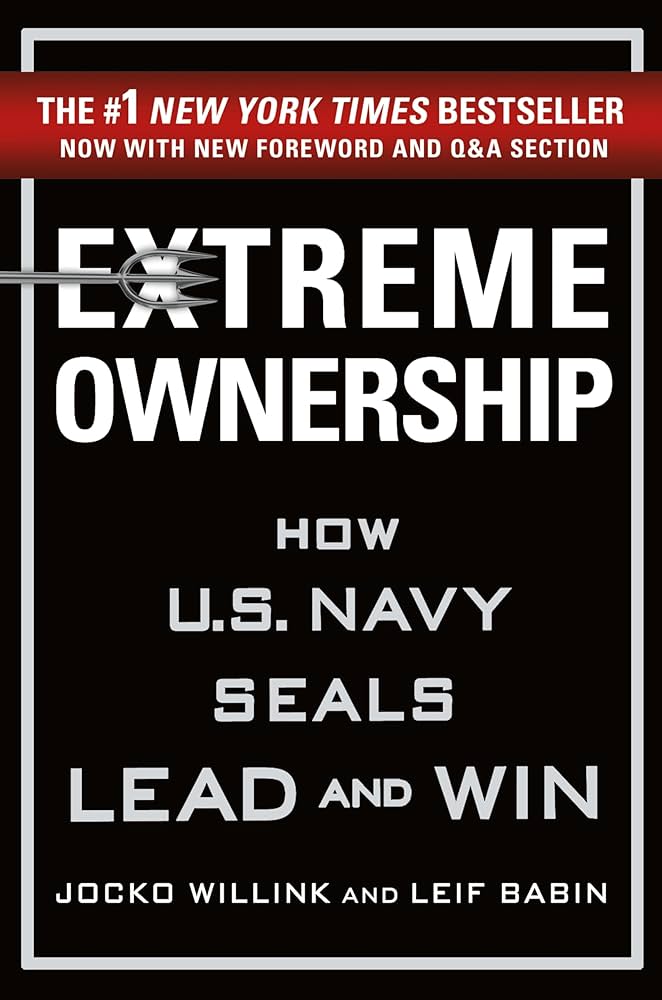"How U.S. Navy SEALs Lead and Win"

Here we go about owning it, to the extreme! Yes, we all know about taking responsibility and here we do that and then some.
Written by Jocko Willink and Leif Babin (both former Navy SEAL officers), they share leadership lessons from their time in the military and give examples of how they can be applied to business and our personal lives.
Each chapter uses real-life combat examples to illustrate each principle, followed by how it applies to us in the wider world. At its core, the message is that leaders must take full responsibility for their team's outcomes, whether that be good or bad…
Top Ten Takes (+1 for luck)
1. Extreme Ownership
The title of the book so why not?!
Leaders must own everything in their world, including all mistakes and failures. They should never blame others but take full responsibility for their actions and those of the team. By doing so, they create a culture of accountability and trust.
It's not just about picking and choosing when you take responsibility, but all things at all times even when it's clearly not your fault… it partly is so you acknowledge that and take any required actions.

2. No Bad Teams, Only Bad Leaders
The performance of a team is directly related to the leadership it receives. Effective leaders can turn around underperforming teams by instilling discipline, setting clear expectations, and leading by example.
Of course there are all sorts of people in a team whose contributions vary, but here we're talking about a fish stinking from the neck down (and whatever the opposite is) and a good leader will always get the best out of a 'poor' team… and a poor leader may well drag down a good team.
3. Believe
Belief is at the core of everything, and there's no exception here. Leaders must fully believe in the mission and understand why it’s important. If they don't, they won't be able to convince others to follow them and the whole thing will be a mess.
We can't transfer certainty without being certain ourselves. This all allows leaders to communicate the mission effectively to their team and be a success (as well as keep good morale).
4. Check the Ego
Leave it at the door, man.
Ego can be a significant obstacle to success and leaders need to set aside any arrogance to make the best decisions for their team and mission. This includes listening to others, accepting constructive criticism and admitting when they're wrong.
It's not a place for being stubborn or thinking you are the best. You may be great, but being humble and adaptable earns respect as well as helps the missions run smoothly.
5. Cover and Move
Teamwork is critical. The concept of cover and move is about mutual support within teams. Leaders must ensure that all team members work together towards the common goal, helping each other succeed.
Keep your wits about you, make sure everything is covered and keep on moving swiftly but carefully.
6. Simple
As in keep it simple, stupid. Complexity breeds confusion and keeping plans and communication simple ensures that everyone understands their roles and responsibilities. They are also easier plans to execute and adapt when circumstances change.

7. Prioritise and Execute
A central premise and one that I've heard Jocko talk about in the past. That is, getting your priorities straight and then attacking each one in sequence (re-assessing where necessary) and keep right on.
In stressful situations, leaders must remain calm and identify the most critical problem. That prioritises it, and then comes the execution of the plan to address it. Trying to tackle too many problems at once leads to overwhelm and failure (the ol' chasing 2 rabbits scenario).
8. Decentralised Command
Effective leaders delegate tasks and decision-making authority to subordinates who are closer to the action. This empowers team members to make decisions who in turn take ownership of their responsibilities, which increases overall team effectiveness.
Spreading out the tentacles and allowing others who are in a better position to do more to do so. Knowing when to delegate is key and being able to give that power whilst being in control of the overall operation.
9. Plan
Fail to plan, plan to fail bla bla bla. But it is true that there does need to be some sort of plan to follow. Adapt it, sure, but everyone needs a roadmap to follow.
Leaders must develop those clear and detailed plans. They should also involve their team in the planning process to ensure everyone understands the mission and their role in it (and makes them feel a part of it and how the parts fit in to the whole).
Planning also includes anticipating potential issues and preparing for them making it more robust and adaotable.
10. Leading Up and Down the Chain of Command
Leaders must effectively communicate with both their superiors and their subordinates. This ensures that the higher-ups understand the situation on the ground, and the team understands the mission's strategic objectives.
Everyone needs to understand what's happening and having a clear message in all directions means things can flow as they should. And it will also make clearer any after action reports and what should be done in future.
11. Discipline Equals Freedom
Bonus for you. This is the name of another one of Jocko's books that may well be worth a look. The clue is in the title as ever… discipline is one of cornerstones to success. By maintaining discipline in their actions and habits, leaders create the freedom to operate effectively and efficiently.
Consistent discipline in the small things leads to success in larger, more complex tasks. This of course applies to all people, at all levels, and in all situations.
Check out this video review from 'Wisdom for Life' on YouTube…
Thanks Jocko & Leif! Anything Else?
Jocko has a podcast and other things going on around social media. He is a no nonsense kind of character (as you might expect!) and is a direct talker. Leif I don't know much about and perhaps isn't as well known in let's say 'influencer' circles but has done plenty in terms of military and his other contributions.
We covered David Goggins a couple of times (in his books Can't Hurt Me and Never Finished), so this could tie in with those. Similar in some respects, there are differences in Goggins' approach with Jocko, upbringing and views on sharing their messages but both beasts and worth listening to. It's not clear whether the 2 get along, if they crossed paths in the military, or why no podcast appearances featuring the 2, but we'll leave that up to them.
The central tenets or taking full responsibility (to the nth degree) for yourself and your team, prioritising and executing on what's necessary at a given time, will apply to all. Those interested in military strategies and action will enjoy the references here.
First image my own, other images and video linked to source
- 1-50: First 50 BookBabbles
- 51: THE DAILY STOIC - Ryan Holiday
- 52: MAKE TIME - Jake Knapp & John Zeratsky
- 53: GRIT - Angela Duckworth
- 54: WHAT I TALK ABOUT WHEN I TALK ABOUT RUNNING - Haruki Murakami
- 55: THE PURSUIT OF PERFECT - Tal Ben-Shahar
- 56: THE SLIGHT EDGE - Jeff Olson
- 57: CONTAGIOUS - Jonah Berger
- 58: THE RICHEST MAN IN BABYLON - George S. Clason
- 59: THE 5 AM CLUB - Robin Sharma
- 60: THINK LIKE DA VINCI - Michael Gelb
- 61: INFLUENCE - Robert Cialdini
- 62: THE ONE THING - Gary Keller
- 63: THE 12 WEEK YEAR - Brian Moran & Michael Lennington
- 64: THE POWER OF YOUR SUBCONSCIOUS MIND - Joseph Murphy
- 65: THE UNTETHERED SOUL - Michael A. Singer
- 66: ON WRITING WELL - William Zinsser
- 67: PRINCIPLES - Ray Dalio
- 68: HYPERFOCUS - Chris Bailey
- 69: THE OBSTACLE IS THE WAY - Ryan Holiday
Posted Using InLeo Alpha